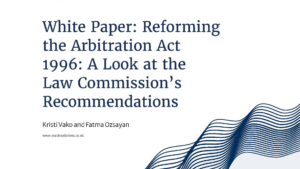EU reaches Landmark AI Law Agreement: A step towards a responsible and trustworthy Artificial Intelligence
Have you got a question?
Artificial intelligence (AI) has revolutionised various industries, from healthcare to transportation, and is poised to play an even more significant role in the future. However, the rapid development of AI has raised concerns about its potential impact on society, particularly in areas such as algorithmic bias, privacy, and ethical considerations.
In a groundbreaking development, the European Union (EU) has enacted the world’s first comprehensive set of regulations governing artificial intelligence (AI), marking a significant step towards responsible AI governance and fostering innovation.
The EU’s Artificial Intelligence Act (AIA) aims to promote innovation while safeguarding fundamental rights, democracy, the rule of law, and environmental sustainability. It establishes a risk-based approach, classifying AI systems into four tiers based on their potential impact: unacceptable, high, limited, and minimal.
- Unacceptable AI systems, deemed to pose an inherent threat to fundamental rights, are prohibited outright.
- High-risk AI systems, such as those used in critical infrastructure or healthcare, must undergo stringent assessments, risk mitigation measures, and independent audits.
- Limited-risk AI systems, encompassing those employed in marketing or consumer goods, require transparency and data protection compliance.
- Minimal-risk AI systems, considered low-impact, are encouraged to adhere to ethical guidelines and best practices.
The AIA’s far-reaching implications extend to businesses across the EU, transforming the way AI is developed, deployed, and utilised. Businesses must now assess the risk level of their AI systems and comply with the corresponding regulatory requirements.
If the AIA is enacted then companies that deploy AI systems in the EU will be required to be compliant. That means that having suitable systems and frameworks in place becomes essential. Businesses should prepare for these regulations rather than face future fines or reputational damage.
A Groundbreaking Framework for Responsible AI
The AIA stands as the most robust regulatory framework to ensure the ethical development and deployment of AI systems. Key provisions of the Act include:
- Risk-Based Classification: AI systems are categorised into four risk classes: unacceptable, high, limited, and minimal. This allows for tailored regulatory measures commensurate with the severity of potential AI-related risks.
- Unacceptable AI Ban: AI systems that pose an unacceptable risk to fundamental rights, such as those promoting discrimination or manipulation, are prohibited outright.
- High-Risk AI Oversight: For AI systems deemed high-risk, due to their potential impact on public safety, security, or fundamental rights, businesses must implement stringent safeguards, including independent conformity assessments, risk mitigation measures, and data protection protocols.
- Limited-Risk AI Accountability: AI systems categorised as limited-risk, such as those employed in marketing or consumer goods, still require businesses to adhere to transparency obligations and ensure data processing practices align with ethical principles.
- Minimal-Risk AI Responsible Use: For AI systems deemed minimal-risk, businesses are encouraged to adhere to ethical guidelines and best practices to promote responsible AI development and usage.
A Transformative Impact on Businesses
For unacceptable AI systems, businesses will be required to cease their development, sale, or use. For high-risk AI systems, a comprehensive set of compliance measures is mandated, encompassing technical and risk mitigation strategies, independent conformity assessments, and comprehensive recordkeeping.
Limited-risk AI systems entail fulfilling specific obligations, such as providing transparency to users regarding data usage and ensuring data processing complies with data protection principles. For minimal-risk AI, businesses are encouraged to adopt ethical considerations and best practices to promote responsible AI practices.
How Oracle Solicitors can help
Oracle Solicitors can provide expert legal advice to businesses on the AIA, helping them to comply with the law and navigate AI regulations. Our team of experienced lawyers can assist businesses in:
- Assess the risk level of their AI systems
- Comply with the requirements for different risk classes of AI
- Develop and implement data protection and privacy policies
- Address ethical considerations and ensure responsible AI use
Businesses operating in the EU must familiarise themselves with the AIA and seek expert legal guidance to ensure compliance and responsible AI practices. Our team of experienced lawyers are dedicated to assisting clients in navigating regulatory frameworks, offering tailored advice and strategic solutions to help them achieve compliance and harness the full potential of AI technologies. Contact us today at [email protected] or +44 020 3051 5060 to find out more.
-
Aviation House, 125 Kingsway
London WC2B NH
United Kingdom
- (+44) 020-3051-5060
Book a call back
Share this article
Got a question?
Please complete this form to send an enquiry. Your message will be sent to one member of our team.
Related posts

Tax Efficient Pension Planning?
With the speculation rife about the new Labour government’s potential changes to pension policies, planning for a tax-efficient retirement is more pertinent than

Unplugged: How Labour’s reforms may impact your evenings
In today’s hyper-connected world, where many employees have email and instant messaging on their mobiles, the boundaries between work and personal life are

Compensation secured from injury caused by e-scooter used in a London overground train station
Suffering an injury at work can be a stressful and traumatic experience. Apart from dealing with the pain and recovery, you may also have to take time off work, lose wages, and incur medical expenses.

Reforming the Arbitration Act 1996: A Look at the Law Commission’s Recommendations
Have you got a question? Enquire Now Kristi Vako and Fatma Ozsayan have looked at the new recommendations published by the Law Commission.



